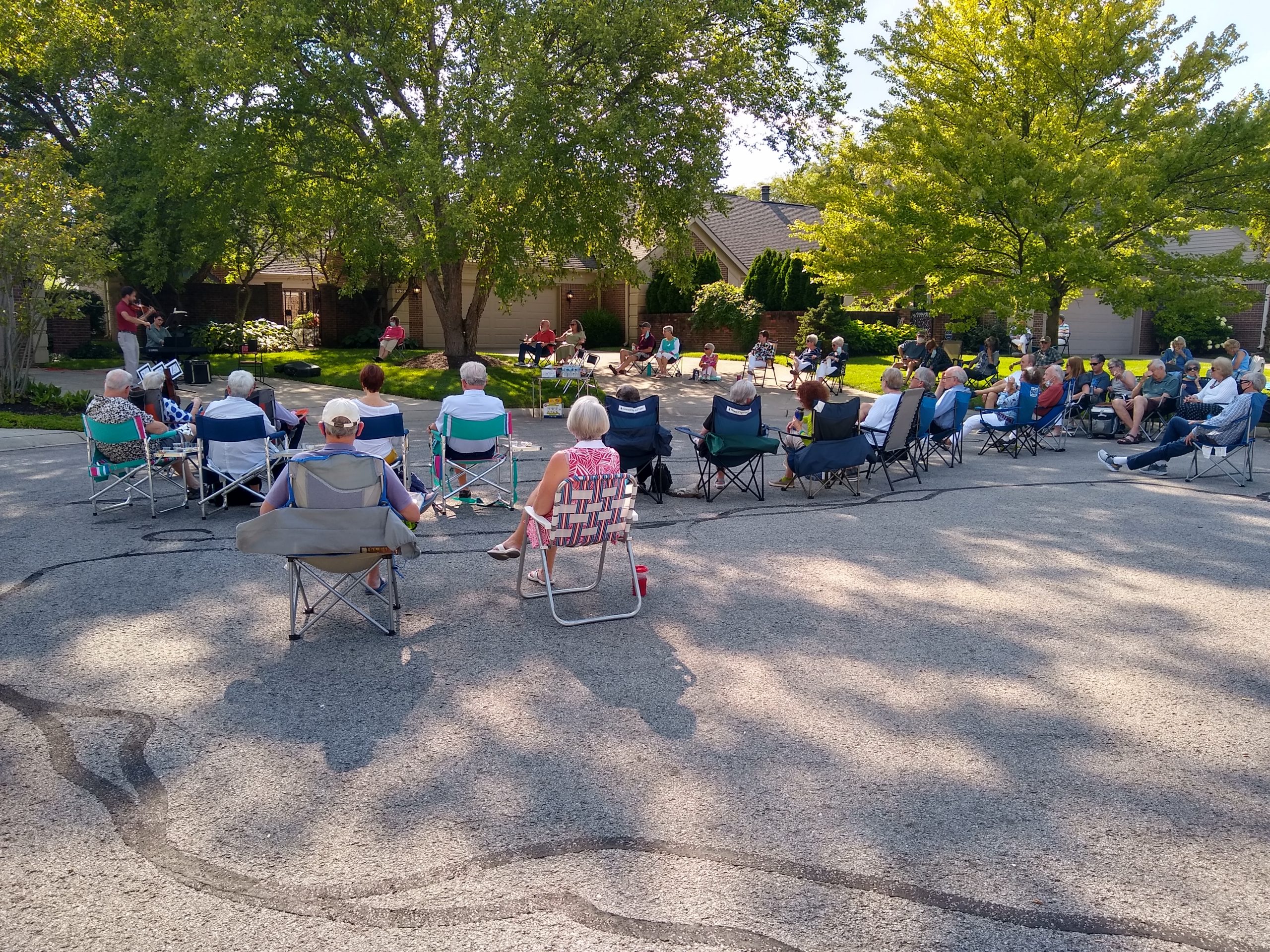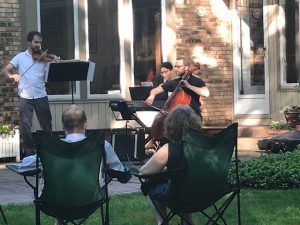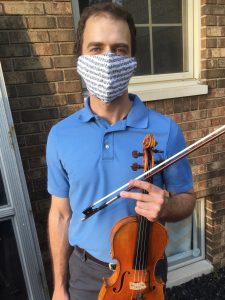
Vickery Chamber Live concert – Courtesy of Vickery Chamber Live. Used with permission.
Starved for live performance, I immediately said yes when my friend Fernando Serpa invited me to join him for an outdoor concert a few weeks ago. Featuring professional musicians, it was held at The Overlook at Williams Creek, his neighborhood on Indy’s far northwest side. Serpa, an arts lover and patron, moved here from L.A. last year with his husband Ricky Buckner.

Peter Vickery – Courtesy of Indianapolis Symphony Orchestra. Used with permission..
Joining a relaxed crowd of at least 50 of his neighbors, we gathered in front of The Overlook clubhouse, with social distance maintained and everyone wearing masks. Sharing beverages and a cheese plate, Serpa and I settled in for nearly an hour of sublime music performed by The Vickery Three, minus one of its regular players. On violin was Peter Vickery, assistant concertmaster of the Indianapolis Symphony Orchestra. Playing piano was his sister Allison, a University of Indianapolis graduate who teaches lessons in her private studio. Their brother Nathan, the third member of the trio and a cellist with the New York Philharmonic, was not available that evening to perform.
The musicians’ thoroughly engaging and entertaining program included Tango (Por Una Cabeza), Gardel-Williams, Brahms’ Sonata in D Major, op. 137, Gershwin Piano Preludes No. 1 and No. 2, Rachmaninoff’s Rhapsody on a Theme of Paganini, Variation No. 18, arr. Fritz Kreisler, and others.
The Vickery siblings formed The Vickery Three in 2013. It is associated with Vickery Chamber Live, which exists to bring world-class, live, classical music to neighborhoods throughout Indianapolis. After many concerts were canceled due to COVID-19, the group saw a need to provide musicians opportunities to share their music live with the community. They began to present informal, socially-distanced outdoor concerts with small groups of musicians, which are refreshing for both the audience and performers.
Following the concert, I approached Peter Vickery to express my thanks and appreciation for the concert, but also to ask him for an interview. Before coming to Indianapolis Symphony Orchestra, he earned a Bachelor of Music in Violin Performance at Indiana University Jacobs School of Music, studying with Alexander Kerr, and also with Mimi Zweig and Brenda Brenner at IU String Academy. Vickery is a former member of the Milwaukee Symphony Orchestra and Indianapolis Chamber Orchestra, as well as former concertmaster of the Terre Haute Symphony Orchestra. While on furlough from ISO, Vickery has been performing with The Vickery Three and manages Vickery Chamber Live.
The rest of Vickery’s time is spent at home with his wife Joyce and their six children. He met his wife at IU, where she studied music composition. Their children, whom the couple homeschools, are James, 10, Lily, 9, Stephen, 7, Micah, 6, Bethany, 4, and Ethan, 2. Recently, I spoke by phone with Vickery. Following is an edited transcript of our conversation.

Peter & Joyce Vicker & family. Courtesy of Peter Vickery. Used with permission.
Are any of your children musicians?
James is playing piano. Lily plays violin and Stephen is a cellist. It is very interesting to see their different personalities as they are learning music. My wife played several different instruments growing up and got her degrees in composition at IU, where we met. Her main instrument there was bassoon. She writes music when she has time and recently had a choral piece published.
What prompted you to do regular concerts with The Vickery Three?
My wife Joyce prodded me to talk to my brother Nathan. He and his wife and baby daughter came to Indy from NYC after the shutdown because they were living in a one-bedroom apartment, couldn’t go out and wanted more room. The New York Philharmonic canceled concerts, at least until January, and she was able to work at home, so they came here. It has been great to perform with him. We did a couple of duo concerts with violin and cello and it just went from there. At the beginning of the pandemic, it was difficult to figure out what to do. No concerts to prepare for. Everything stopped in terms of work. Of course, I was at home with my wife and six kids, so there was a lot going on. I was quite busy just figuring out how to live together and what to do.
What have these concerts resulted in?
These concerts have really given me an artistic outlet and something to focus on. I’ve been busy arranging music, finding programs for the audience and the musicians to put together, finding musicians to play, and people to host the concerts. It’s been a really nice learning experience for me. I also do all the marketing and my brother is involved by recording the concerts. It’s been interesting to market in this environment because early on, public gatherings were limited to 50 people, so we had to figure out ways not to market too much. We started with email invitations to friends, so we could have an RSVP list to make sure we were not going to exceed. Now, numbers are nebulous for outdoor events.
Has the word gotten out about your concerts?
News about the concerts has been spreading by word of mouth. The head of the social committee at The Overlook has a relative who attended one of their concerts in a neighborhood near where she lives, so she told our contact, who later reached out to us about it. The concerts started with just people in their own circles, church and neighborhood. Then, as we met people, we asked if they could host concerts in their backyards and patios. We have also done some private events too that we don’t advertise.
Do you charge for your concerts or rely on contributions or both?
We have done concerts for a flat fee, concerts funded solely by audience contributions, and concerts with some of both. The hosts of our concerts are so important, offering a space for us to perform and inviting their circle of friends and neighbors. We work with them and put on concerts with their preference of funding.
Have they paid off for you financially?
Yes. It has been a way to help with income loss from ISO. People are generous. They definitely are. I wanted them to be, not only for my brother and sister as The Vickery Three, but also to branch out to other musicians. So, we have done string quartets with other musicians. We wanted to help other musicians financially and to provide a way for them to perform.

The Vickery Three L-R Peter Vickery, Allison Vickery & Nathan Vickery. Courtesy of Vickery Chamber Live. Used with permission.
What has been the response from your audiences?
The response has been really great. One lady said this was really enjoyable for her because it was the first time she gathered with other people and they didn’t talk about politics or COVID. They were just there to relax and listen to music and take a break from the crazy world.
What happens once the weather turns?
We hope to find some bigger, indoor venues where there will be plenty of room for the audience to spread out. We’ll probably go back to asking for RSVPs or some sort of ticketing system to monitor crowd size. We would love to do more concerts when the weather turns, but we’ll just have to wait and see.
Tell me about yourself. Why did you choose the violin as your instrument?
The story goes that I had a friend who had just started violin and I wanted to follow in his footsteps, so my parents got me a violin and enrolled me in lessons.
How old were you when you started playing?
I have been playing violin since I was 6 years old.
What does music mean to you?
Music is an incredible form of communication. It gives a voice to so many emotions, including those we often have difficulty expressing. The creative act of performing live music is amazing. The composer creates a piece of music, often without hearing the final product, and writes down the notes. A sketch, or outline of the music. Then, we as performers look at the sketched-out music and interpret the written notes into sounds. Finally, the audience participates in this creative process when they hear the completed, realized work, and in that moment, they can sense what the composer desired to get across.
Also, because each member of the audience, each musician, brings their own experience to the live performance, a piece of music can be felt uniquely by each person hearing or playing it. And then we could play the piece for the same exact audience the next day, and it will be heard differently than the day before.
What does the ISO mean to you?
ISO is the people, musicians, staff and board working toward a shared goal of presenting world-class music to Indianapolis and beyond. These colleagues are the reason I enjoy working for the ISO. We can, together, create incredible works of art to share with the community. Without talented, dedicated people, the ISO is a ship without sails, with no way of achieving its artistic mission.
 What do you miss the most about performing with the ISO?
What do you miss the most about performing with the ISO?
What I miss most is collaborating with that many people, all working toward the same goal. All exceptional musicians and professional at their instruments. All working at this goal to bring artistic work to the audience. When you get that many people pulling together for the same thing, it is really amazing. In a way, it can take more work to sacrifice just a little bit more than if you are just playing chamber music, where you can have a little more artistic freedom. In an orchestra, you have to know when to put in the artistic freedom and when to step back and let others lead the way. It’s amazing the way it all comes together.
When you’re able to sit there and look and see other musicians, such as oboists Jennifer (Christen) and Roger (Roe), breathing and making beautiful music and communicating with other people in the orchestra and the conductor, it’s just really inspiring when you are playing with other musicians.
Have you imagined what it will be like to be dressed in your tux, on stage at the Hilbert, playing live again with your fellow ISO colleagues?
I think it will be emotional because it has been so long since we’ve done it. Usually, the longest break we have is six weeks. It’s been almost half a year at this point. There are so many memories you make as you are performing concerts. The joy of seeing people in the seats. Maybe that won’t happen right away, but to see people in the audience again will be indescribable.
For more information about Vickery Chamber Live and The Vickery Three, go to vickerychamberlive.com.





